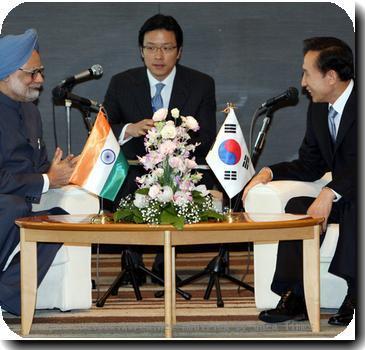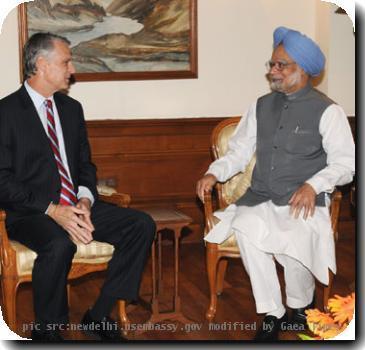India, Saudi Arabia to sign about ten agreements
By Aroonim Bhuyan, IANSSunday, February 28, 2010
RIYADH - Around ten agreements, including an extradition treaty, is likely to be signed during the current visit of Indian Prime Minister Manmohan Singh to Saudi Arabia. A Riyadh Declaration is likely to cement the bilateral ties that have gone “beyond the normal cliches”, Minister of State for External Affairs Shashi Tharoor said here.
“You may see language in the Riyadh Declaration you may not have seen before,” Tharoor said while informally interacting with the media here late Saturday night after the prime minister arrived here on a three-day leading a powerful delegation of ministers and officials.
It is the first visit of an Indian prime minister to Saudi Arabia after 28 years.
The Riyadh Declaration is likely to take forward further what the historic Delhi Declaration, signed during the visit of Saudi Arabia’s King Abdullah Bin Abdul Aziz to India in 2006, had chalked out.
Around 10 agreements covering fields like security, science and technology, culture and media are likely to be signed during the course of the prime minister’s visit, the highlight of which will be an extradition treaty between the two sides.
Calling for a wide-ranging strategic partnership between the two sides, the Delhi Declaration had charted out a new path for enhanced cooperation in energy and economic ties and a commitment by both sides to cooperate in the fight against terrorism.
Stating that there has been a qualitative change in relations between India and Saudi Arabia, Tharoor said: “It has gone beyond the normal cliches of bilateral relations. This is a relationship that has genuinely taken a leap forward.”
According to the minister, when the Saudis use terms like strategic partnership, “one talks about a shared view of the world”.
“We have seen the problem of so-called state terrorism. But we can sensitise our friends here on this,” Tharoor said.
During parleys with King Abdullah Sunday night, the issue of regional security and anti-terrorism measures is likely to get top priority.
Regarding the issue of good Taliban and bad Taliban, Tharoor said the Indian side would make it very clear that there will be no place in the peace dialogue for those who try to enforce their extreme views on religion through the barrel of the gun.
“Those people who are called Taliban and who are willing to accept the democratic process and are willing to lay down arms and participate in the national integration of the Afghan country within the national system under (Afghan President) Hamid Karzai, such people India is willing to see coming,” he said.
“Those who believe that pluralism is wrong, who believe in the extreme view of their religion and who want to enforce their views of their religion through the barrel of the gun, such people will have no place in the dialogue,” Tharoor said.
“This is what we will be saying to the Saudi side. And I am sure the Saudis will not disagree.”
The minister also mentioned Saudi Arabia’s outright condemnation of the 26/11 attacks in Mumbai. “After 26/11, they were vociferous in their condemnation and sent a senior leader to India to express their views,” the minister pointed out.
(Aroonim Bhuyan can be contacted at aroonim.b@ians.in

